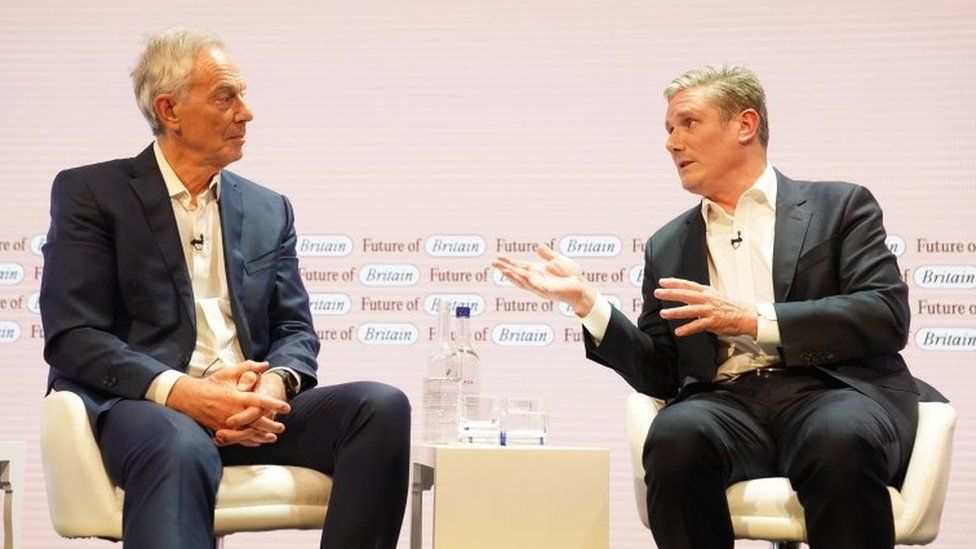
By Joshua Nevett
BBC Politics
At a conference dedicated to the future of Britain, Labour leader Sir Keir Starmer made a very deliberate nod to the past.
To get our future back, Sir Keir said, “we need three things: growth, growth, growth”.
“You might have heard a refrain a bit like that before,” Sir Keir said.
The former Labour prime minister sat smiling in front of him certainly had.
“Education, education, education” was how Sir Tony Blair set out his three priorities for government in 1996, before his party ended 18 years of Conservative rule with a landslide election victory.
With Labour leading in the polls ahead of a general election next year, Sir Keir feels the party he now leads is on the cusp of ending another long period of Conservative government.
His speech at the Future of Britain conference on Tuesday was his latest attempt to argue that Labour is ready for government.
With a crunch set of by-elections only days away, and Labour discontent growing over his refusal to abolish the two-child benefit cap, Sir Keir mounted an impassioned defence of his programme for government in the teeth of enormous economic challenges.
His answer to lift the county out of the doldrums?
Growth, he said, “is the only answer that can restore long-term hope and opportunity”. “We need to rebuild the foundations of our economy, fundamentally change Britain’s growth model,” he said.
Blair echoes
What was striking about Sir Keir’s messaging in this speech was the ways in which it overlapped with Sir Tony’s. It’s been a common theme recently.
Last week, Sir Keir penned an article with lines that wouldn’t have felt out of place in Labour’s 1996 manifesto.
One of the most distinct parallels was the language on spending. For example, the ’96 manifesto says: “The level of public spending is no longer the best measure of the effectiveness of government action in the public interest.”
And Sir Keir’s article says: “Pointing at problems and promising vast sums of money to fix them has too often been the comfort zone of Labour oppositions.”
Image source, Getty Images
Tony Blair led Labour to a landslide election victory in 1997
Like Sir Tony was in the 90s, Sir Keir is at pains to stress that economic credibility must come before all else, in part to nullify Tory attacks on Labour’s financial competence.
Sir Keir has made no secret of his admiration for Sir Tony and his record for winning elections. Behind the scenes, Sir Keir has been advised by some of the former prime minister’s closest allies, including the architect of New Labour, Peter Mandelson.
The comparisons between Sir Keir and Sir Tony only go so far though.
Daunting task
The circumstances now are very different to those in the 1990s, an era of sustained economic growth and optimism following the end of the Cold War.
In 2023, the UK is on the brink of a recession, with inflation and interest rates soaring to highs not seen in decades. And that’s not to mention the challenges posed by climate change, migration, artificial intelligence, the invasion of Ukraine and an ageing population.
“Make no mistake, it’s a new age of insecurity and we’re not even close to match-fit,” Sir Keir said in his conference speech.
The task awaiting the next government is a daunting one, and Sir Tony reflected that in a conversation with Sir Keir, following the Labour leader’s speech.
“I think we both agree that 1997 is very different from 2023,” Sir Tony said. In short, “it’s grim”, the former PM said.
For those old enough to remember, one of the hallmarks of the Blair ascendancy was Things Can Only Get Better, the euphoric dance-pop hit that New Labour adopted as its campaign theme song.
The song “resonated because it felt like that was the mood of the country,” Sir Keir said.
“That’s not the position now, by a long shot.”
He went on: “It’s a mistake to speak to the country as if it’s 1996. We’ve got to the speak to the country as it is in 2023.”
As Sir Keir seems to acknowledge here, in these difficult times, the Blair model is no off-the-shelf guide to victory at the next general election.








